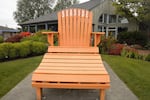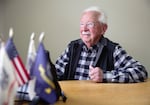
Traci Collings says she has nowhere to go; the city of Seaside is pushing her and other campers off a city-owned lot that neighbors say has become a nuisance.
Kristian Foden-Vencil / OPB
Traci Collings and her husband have lived in Seaside for 21 years. He fixes bikes and she makes about $13 an hour cleaning vacation cottages.
But four years ago, they fell on hard times.
“We had a really cute two-bedroom duplex and everything,” she said. “Then the landlord raised the rent $600, like that. And my husband lost his job at the same time as he did that, and it was just crazy. So we lost everything.”
The couple started living in a battered RV. But they kept being kicked out of parking spots. Then they found a city-owned lot not far from the downtown tourist area at 10th Avenue and Necanicum Drive, where authorities seemed to be turning a blind eye to long-term parking. Over time, they were joined by about 25 other RVs and maybe 40 people. Neighbors started reporting break-ins, drug abuse and littering.

Homeless advocate Seamus McVey helped people move off the city lot at 10th Avenue and Necanicum Drive in Seaside as it was swept by police and the city.
Kristian Foden-Vencil / OPB
“We get harassed constantly,” Collings said. “My husband loves to repair other people’s bikes for them. We got complaints: ‘Oh, you’ve got too many bikes. There’s only two of you. Why do you have so many bikes?’ They wouldn’t even talk to us nice or nothing. They would yell nasty kind of stuff.”
When OPB visited earlier this month, the city was moving everyone off the lot, enforcing a newly passed ordinance.
Collings said she can’t simply drive somewhere else. The RV she’s living in doesn’t run anymore and she can’t afford the cost of repairs and insurance.
She has looked into renting, but the cost is prohibitive. “They want, what, $3,000 to move into a little, itty, bitty studio apartment,” she said. “It’s crazy.”

“We get harassed constantly,” Collings said of her experience living in an RV in Seaside.
Kristian Foden-Vencil / OPB
Local homeowners said they understand it’s hard being homeless. But retired carpenter Tom Veazey, who lives diagonally opposite from the lot, said he’s happy police told everyone to move.
“It’s been noisy. Generators were up and running day and night,” he said. “And you can’t believe what it feels like to have strangers moving … like zombies, walking back and forth through your neighborhood at midnight.”
Veazey said seemingly able-bodied men sat around the camp drinking. There were piles of trash, and someone even slept under his deck. He said a constant procession of cars arrived, then quickly left. He took pictures of what he suspects were drug deals and gave them to the city.
Veazey said he thinks Seaside simply doesn’t have the infrastructure to deal with a large homeless camp: “They have no rescue plan for them. They don’t have a county bus backing up and taking them to the county facilities, or the state facility. They’re leaving them on the streets in Seaside.”

Retired carpenter Tom Veazey lives kitty corner from the homeless camp and he's pleased it's been cleared out,
Kristian Foden-Vencil / OPB
Seaside, like many small towns, has always had a homeless population. But Mayor Jay Barber said the mix of people living outdoors is changing.
“Before it was men carrying their rucksack and maybe their dog along with them,” he said. “(Now) we see women with small children. We see elderly people who have no longer been able to pay their rent or maintain their homes.”
Barber said crime and trash at the 10th and Necanicum Drive camp grew so bad the city had to do something.
Police can’t remove the homeless camps under the city’s old ordinance because of the legal case known as Martin vs. Boise, in which the U.S. Ninth Circuit Court of Appeals ruled that cities can’t kick people out of an area if they don’t have somewhere else to go. Seaside doesn’t have a low-barrier overnight homeless shelter.

Seaside, like many small towns, has always had a homeless population. But Mayor Jay Barber said the mix of people living outdoors is changing.
Kristian Foden-Vencil / OPB
The town’s solution was to borrow and tweak a homeless ordinance used in Coos Bay.
The new ordinance bans campers from 10th Avenue and Necanicum Drive but allows them to spend the night at the nearby Mill Ponds natural area instead. They must leave by 8 a.m. each day.
Barber thinks it’s a reasonable solution, though he isn’t sure it would stand a legal challenge: “It’s a starting place. Let’s start with this. And then once it’s in effect, let’s go back and look at how we can improve it.”

Seaside Mayor Jay Barber thinks the new homeless ordinance is a reasonable solution, though he isn’t sure it would stand a legal challenge.
Kristian Foden-Vencil / OPB
Improvements might include providing some city land where people can put up a tent and stay for a few weeks, rather than having to move every day.
So far, Seaside Police have issued 23 free permits to camp at the Mill Ponds land, which is near U.S. Highway 101, but in practice, only a couple of RVs and tents are there most evenings. Others have moved on. Seaside is not the only coastal town with homeless camps.
Barber thinks it’s a pretty good result: “Many of the campers have relocated out of town, only a couple are using the Mill Ponds parking area at night.”
He said trash and needles at Mill Ponds have been cleaned out.
Tita Montero sits on the Seaside City Council but didn’t vote for the ordinance. Still, she thinks it’s better to do something.
“Certainly the neighbors would define success as getting everybody off that lot,” she said. “Other people would define success as getting help for those people who need the help.”
She understands former campers wouldn’t consider the ordinance a success, but she says there were some people dealing drugs and doing other illegal things on the city lot.

Seaside City Council member Tita Montero didn’t vote for the ordinance. Still, she thinks it’s better to do something rather than nothing,
Kristian Foden-Vencil / OPB
Some cities, like Portland and Vancouver, have opened new shelters and campgrounds for homeless people. But that’s an expensive proposition for Seaside.
Meanwhile, the Mill Pond natural area, where Seaside is allowing people to camp, was purchased with public funds from the North Coast Land Conservancy group. It was supposed to be preserved and protected, not used as a campground for people experiencing homelessness. Land conservancy leaders aren’t thrilled with the city’s solution.
“Because the homeless community is being treated as less-than, and told they may not occupy the Mill Ponds area during the day, they are seeking other places to live on neighboring private property, including neighboring wetlands, which are now becoming very damaged,” executive director Katie Voelke said in an email.
She calls the situation complex and heartbreaking.

Rocky Guerrero said he's been homeless at the Mill Ponds area for about a year. The city's new policy means he needs to pack up his belongings each morning.
Kristian Foden-Vencil / OPB
Editors’ note: This story has been updated to better clarify language about police removing homeless encampments, and the headline has been adjusted for clarity.
